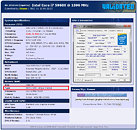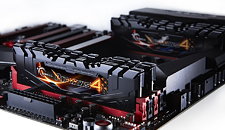- Joined
- Oct 9, 2007
- Messages
- 47,783 (7.40/day)
- Location
- Dublin, Ireland
| System Name | RBMK-1000 |
|---|---|
| Processor | AMD Ryzen 7 5700G |
| Motherboard | Gigabyte B550 AORUS Elite V2 |
| Cooling | DeepCool Gammax L240 V2 |
| Memory | 2x 16GB DDR4-3200 |
| Video Card(s) | Galax RTX 4070 Ti EX |
| Storage | Samsung 990 1TB |
| Display(s) | BenQ 1440p 60 Hz 27-inch |
| Case | Corsair Carbide 100R |
| Audio Device(s) | ASUS SupremeFX S1220A |
| Power Supply | Cooler Master MWE Gold 650W |
| Mouse | ASUS ROG Strix Impact |
| Keyboard | Gamdias Hermes E2 |
| Software | Windows 11 Pro |
G.SKILL International Co. Ltd., the world's leading manufacturer of extreme performance memory and solid-state storage, is extremely excited to announce a new memory record for fastest DDR4 memory frequency, set at 4255MHz CL18-18-18! This amazing achievement was attained on the Asus Rampage V Extreme motherboard (X99 chipset) and with the Intel i7-5960X processor, all under sub-zero liquid nitrogen cooling. Below is a screenshot of the record validation by CPU-Z (validation).


View at TechPowerUp Main Site


View at TechPowerUp Main Site








